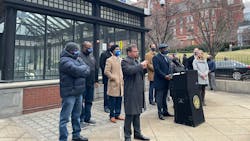Baltimore area leaders push for passage of state transit funding
Following a failed attempt in 2020, Maryland elected officials are planning to reintroduce the Transit Safety and Investment Act on Jan. 13. The bill would provide the Maryland Transit Administration (MTA) with a steady stream of funding to address operational and capital needs.
Baltimore area officials, including Baltimore Mayor Brandon M. Scott, Baltimore County Executive Johnny Olszewski, Anne Arundel County Executive Steuart Pittman and Howard County Executive Calvin Ball to voice support of the legislation say they will “ensure a regional transportation system that is safe, equitably-funded and reliable.” They were joined by representatives from Johns Hopkins, the Amalgamated Transit Union and Tradepoint Atlantic, who each emphasized the role a well-funded, efficient system can plan in connecting riders to anchor institutions and jobs across the region.
The legislation calls for the MTA to see a 4.4-percent increase in its operation budget year-over-year and $29.1 million appropriated from the state’s Transportation Trust Fund for the transit administration’s capital needs. Additionally, the bill addresses MTA’s State of Good Repair needs by appropriating:
- $361.88 million in Fiscal Year 2023
- $414.89 million in Fiscal Year 2024
- $453.84 million in Fiscal Year 2025
- $566.57 million in Fiscal Year 2026 and 2027 and
- $531.57 million in Fiscal Year 2028
“Making the needed investments to build a transportation system that is more responsive and reliable is the key to a safer, stronger, more vibrant Baltimore,” said Baltimore Mayor Brandon M. Scott. “Almost a third of Baltimore households do not have reliable access to a vehicle, with much higher concentrations in historically redlined neighborhoods. Supporting the Transit Safety and Investment Act is one big way we can support our essential workers, including our cleaning staff, medical professionals and transit workers during this public health emergency and beyond.”
The bill is sponsored by state Senator Cory McCray and state Delegate Brooke Lierman. The lawmakers explain the bill would provide the MTA with capital and operating funding to address a backlog of state of good repair needs, maintenance and pressing issues including buses, bus shelters, rail, tracks, safety and security systems and environmentally-friendly technologies.
“I am sponsoring the Transit Safety and Investment Act in the Senate because for too long we’ve allowed our public transit system to be underfunded, failing to meet core infrastructure needs. Our seniors rely on public transit to pickup prescriptions. Our children rely on it to get to school. And it’s become evidently clearer that our region’s frontline workers find public buses and trains a necessity as they meet the essential needs of our neighborhoods,” said Sen.McCray.
In July 2019, MTA released its 10-year capital needs inventory, which funds its capital needs to an estimated $5.7 billion, but with committed funding of $3.7 billion, it was facing a $2.2 billion gap. By asset category, MTA found its greatest capital needs to be in vehicles followed by stations, systems, guideway and facilities.
“The state must maintain its assets and keep up its promise of providing reliable and safe transit to our essential workers and any Marylander who wants it or needs it. Our economy, our environment and the long-term success of our state depend on funding our transit system,” said Lierman.
About the Author

Mischa Wanek-Libman
Group Editorial Director
Mischa Wanek-Libman is director of communications with Transdev North America. She has more than 20 years of experience working in the transportation industry covering construction projects, engineering challenges, transit and rail operations and best practices.
Wanek-Libman has held top editorial positions at freight rail and public transportation business-to-business publications including as editor-in-chief and editorial director of Mass Transit from 2018-2024. She has been recognized for editorial excellence through her individual work, as well as for collaborative content.
She is an active member of the American Public Transportation Association's Marketing and Communications Committee and served 14 years as a Board Observer on the National Railroad Construction and Maintenance Association (NRC) Board of Directors.
She is a graduate of Drake University in Des Moines, Iowa, where she earned a Bachelor of Arts degree in Journalism and Mass Communication.
